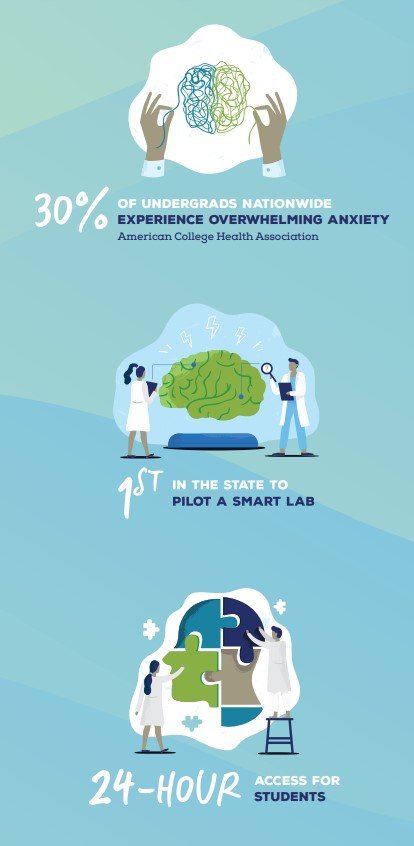
Editor's note: This story first appeared in the fall 2019 issue of the Concordian, the official magazine of Concordia University Wisconsin.
When students decide to enroll at Concordia University Wisconsin, they can expect to learn a great deal: how to think deeply, articulate compelling thoughts, master professional competencies, and ideate with the best of them.
Perhaps less expected, Concordia will teach them how to manage their mental health—and they don’t have to be a psychology major to learn how to do it.
Thanks to a generous grant from The Charles E. Kubly Foundation, Concordia is poised to open the doors to a brand-new Stress Management and Resiliency Training (SMART) laboratory. Named Evelyn’s Place, after beloved longtime Concordia employee Evelyn Hutchins, the SMART Lab, is designed to provide high-quality stress management services for undergraduate students. The university will be the first in Wisconsin and one of only a handful of colleges nationwide to have a lab of its kind.
RELATED: The namesake of Evelyn’s Place
“We really see this as a part of the college experience, especially for undergraduates. This is their transition from adolescence to adulthood,” said Anne Spahr, PhD, a licensed psychologist and one of two full-time counselors in Concordia’s Counseling Center. “We want students to learn that they are capable of managing more than they thought.”
A “Smart” Solution
The lab, expected to open in November 2019, will utilize tools including biometric feedback (or biofeedback) and online educational modules to help students learn about mindfulness, meditation, and breathing techniques in order to reduce stress, anxiety, or feelings of panic.
and online educational modules to help students learn about mindfulness, meditation, and breathing techniques in order to reduce stress, anxiety, or feelings of panic.
Biofeedback therapy trains people to improve their health by controlling certain bodily processes that normally happen involuntarily, such as heart rate, blood pressure, muscle tension, or skin temperature. Concordia’s lab will allow students to connect an electrical sensor to their ear or finger, which will monitor heart rate variability as they practice the coping techniques.
“It’s funny because I’ve had multiple students express skepticism about some of these coping strategies you hear people traditionally telling you to try,” said Spahr. “I actually had one student say to me, ‘If you tell me to breathe deeply, I’m leaving.’ But they really work, and there’s something powerful that happens when they can see the physiological response their body is having as they do these things.”
Modeled after Ohio State University’s SMART lab, Concordia’s version will be housed in the Student Life/Campus Ministry wing of the university, next to the Luptak Terrace Room. The lab will feature pods, or self-contained areas, which will help to maintain a level of privacy even when multiple users are present. Students also must be granted keycard access to enter the room, said Spahr. Access will be received after they participate in an initial training session with one of Concordia’s trained counselors.
“The beauty of this lab is that, once they’re trained, they’ll be able to access it 24/7,” Spahr said. “If it’s midnight and they have a big exam the next day, they can go to the lab, do some relaxation, and have a better outcome.”
Holistic Care
Almost 30 percent of undergraduate students said they experience overwhelming anxiety, according to a 2018 American College Health Association study that surveyed more than 26,000 students at 40 universities nationwide. That same study found that 33.2 percent reported having been diagnosed with or treated for a mental health condition within the past 12 months.
Concordia’s data mirrors the national trend, said Dean of Students Steve Gerner, EdD.
“Today’s Concordians—and college students in general—are facing more pressure than any other generation,” said Gerner. “Our Christian mission compels us to not only care about how well students are performing on tests or within the classroom, but to care about the whole person, as Christ does for each of us. Thanks to the support of the Kubly Foundation, Concordia will be able to enhance a vital piece of our mission to prepare students in ‘spirit’ as well as ‘mind’ and ‘body.’”
The lab is just one of the options available to Concordia students. Of course, they can still see one of the four counselors on CUW’s staff.
It is Spahr’s hope, though, that with the help of the SMART lab, students will discover they have more ability than they knew to help themselves.
“The counseling staff at Concordia is not trying to foster dependence; we’re trying to foster independence, and the SMART Lab will help our students recognize that they are capable on their own of managing many of the anxieties or stresses they’re facing,” said Spahr. “The ability to be resilient and cope with stress is something that can be learned. It’s so important for students to feel that sense of self-efficacy.”
For the latest information on the CUW Counseling Center, click here.
The fall 2019 Concordian hit mailboxes the end of September. View a PDF version of the magazine here. If you are not on our mailing list, but are interested in receiving a free copy, call 262-243-4333.
— This story is written by Kali Thiel. Kali was Director of University Communications until April, 2025.
If this story has inspired you, why not explore how you can help further Concordia's mission through giving.